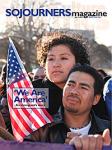Bob Ekblad has been reading the Bible with people who live on the margins—Chicano gang members, prison inmates, and undocumented Mexican immigrants in the United States, among others—for more than a quarter-century.
The director of Tierra Nueva and the People’s Seminary in Burlington, Washington, Ekblad focuses on serving and being in solidarity with people who live in poverty or who find themselves excluded from mainstream society. He uses his remarkable life experience and background as a Presbyterian minister to teach people that the Bible is God’s word of liberation for all.
Some of the stories Ekblad writes about in Reading the Bible with the Damned come from his weekly Bible studies with prisoners at Burlington’s Skagit County Jail. There, Ekblad asks prisoners questions for which they do not immediately have answers. At first they’re overwhelmed by the possibility that they—society’s worst—would have anything to say about something as holy and sacred as the Bible. But what Ekblad helps them see is that scripture is written for them, and that—oddly enough—people who live comfortably within the margins of society might never understand as much as they do about the essence of key biblical stories.
One Bible study discussion begins with the story of Jacob and Esau, in which Jacob tricks his father in order to gain Esau’s birthright. Ekblad asks the men how God responds to Jacob’s crime. “God doesn’t say anything,” one man replies. “It’s like it didn’t matter.” Ekblad follows with these questions: “Was Jacob a religious person? Was he a person who prayed, went to church, read his Bible?” Another man pipes up, “He wasn’t seeking God when God came to him. He was escaping his brother. He committed a crime and fled.”
The men, “sitting in a big circle, Bibles open on their red jail-issue pants, plastic thongs planted on the brown cement floor of the jail’s multipurpose room,” Ekblad writes, slowly encounter a Bible that, rather than being a tool of oppression and condemnation, is instead God’s message of liberation for “bad” people on the margins.
Ekblad’s approach to reading the Bible takes shape as the men read passages out loud and to themselves. They share what they understand about a given biblical story, often unwittingly rearticulating oppressive theologies they’ve learned earlier in life—that Bible stories are about good people who gain God’s favor by doing everything right. Often, the reverse is true.
Ekblad asks them to identify everything in a particular story that tells them about a biblical character. If they’re reading about Moses being called to deliver his people, Ekblad asks, “So where was Moses when God met him? Was he in a Mass or in some church? What was he doing? Was he praying, studying the Bible, looking for God?” The men soon discover the real circumstances surrounding Moses’ call, and they begin to realize that God could call them too. They begin to grasp the importance of God calling Moses from a place of exile.
“Salvaging apparently irrelevant or oppressive biblical stories must include helping people come to see themselves in the stories in ways that maximize the possibility of their hearing a liberating word addressed to them,” Ekblad writes. “Salvaging apparently irrelevant or oppressive biblical stories includes broadening the possibilities of Bible study participants’ actual identification with appropriate characters in the story.”
What’s most remarkable about Reading the Bible with the Damned is that Ekblad allows the truth of God’s message to surface in ways that liberate all of us. Whether we’re spending our lives behind bars or waking up each morning to face the monotony of a nine-to-five job, Ekblad reminds us that God will call us to do God’s words.
Jeshua Erickson, a former Sojourners intern, is a contemporary folk singer/songwriter who works as a computer consultant. He and his wife, Jennifer Vogt-Erickson, live in Albert Lea, Minnesota.

Got something to say about what you're reading? We value your feedback!